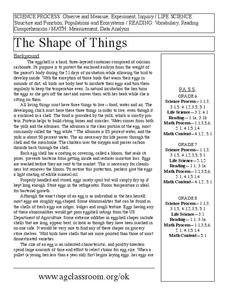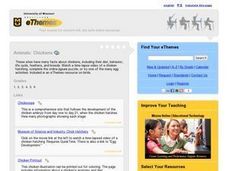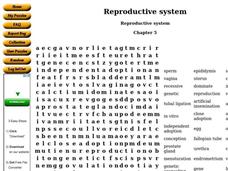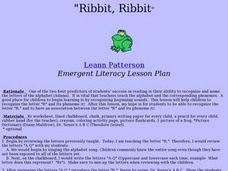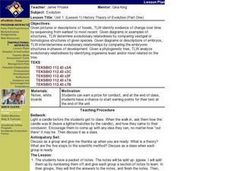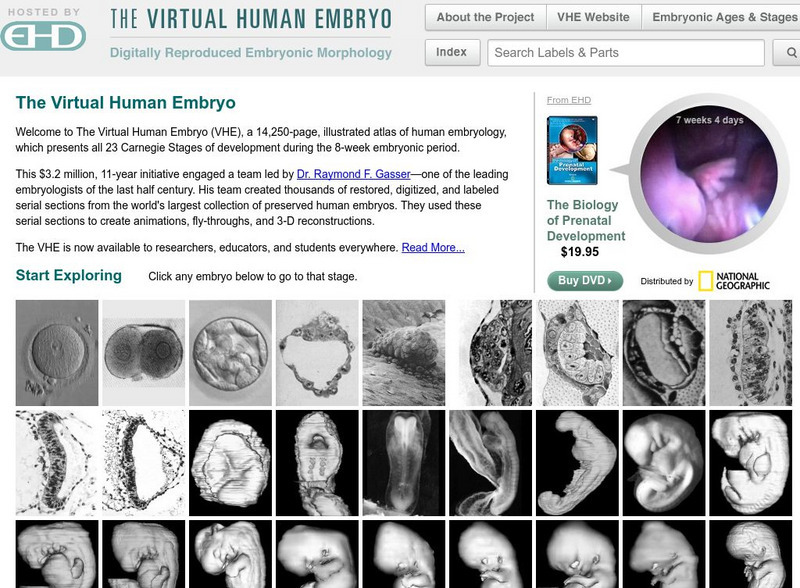Curated OER
The Battle of the Experts
Students view the "Smoking Gun" video as an illustration of someone claiming to be an expert who really is not one. They discuss the fact that some experts also come with biases and personal agendas. Students research experts from...
Curated OER
Reproduction in Flowering Plants
In this flowering plants learning exercise, students review 11 vocabulary words associated with reproduction in flowering plants by matching the term with its definition.
Curated OER
Inside the Egg, Hatching Chickens
Students conduct an egg candling activity to show the life inside a fertile egg. Students discuss the needs the egg has of the hen, as well as similarities and differences between plants and animals. Students complete a life cycle wheel...
Curated OER
The Shape of Things
Students explore dome shape construction. In this dome shape construction lesson, students explore the history, strength, and endurance of the dome shape design.
Curated OER
Animals: Chickens
Students use the Internet to discover information about chickens. They examine their diet, behavior and life cycle.
Curated OER
Self-Assessment
Students take a personal inventory about behaviors. They determine if there are risky behaviors present that could be harmful. The inventory is used to help students examine how to make healthy decisions.
Curated OER
Reproductive System
In this biology worksheet, students find the terms that are related to the human reproductive system and the answers are found at the bottom of the page.
Curated OER
Stem Cell Research
Young scholars examine embryonic cell research and the controversy that surrounds it. In this stem cell lesson students use a debate model and present and defend their positions.
Curated OER
Cell Cycle Duration
Learners examine the cell cycle and how its duration can vary. In this cells lesson students complete a worksheet and answer questions.
Curated OER
Examining Seeds
Learners explore botany by conducting an investigation in class. In this seeds instructional activity, students utilize lima bean seeds and magnifying glasses to examine the different parts of a seed after it has been dissected. Learners...
Curated OER
Sunlight Necklaces
Third graders review the placement and role of the sun in the solar system. Using beads, they create a necklace which they can use to identify the amount of sunlight is being illuminated. In groups, they record observations on the...
Curated OER
Breaking News English: Girl Born with 8 Limbs OK After OP
In this English worksheet, students read "Girl Born with 8 Limbs OK After OP," and then respond to 1 essay, 47 fill in the blank, 7 short answer, 20 matching, and 8 true or false questions about the selection.
Curated OER
Ribbit! Ribbit!
Learners research a frog's life cycle and habitat using books, the Internet and lecture. Students make origami frogs, write letters to Toad from Arnold Lobel's "Frog and Toad" and participate in a simulated camouflage activity.
Curated OER
BUS: From Farm to Table (Ag)
High schoolers study about how the world's most important grains and how they are used. They design an ingredient list for the cereal box to be designed in the Marketing Lesson Option #1.
Curated OER
Bioethics And Fetal Tissue Research
Students are introduced to the topic of fetal tissue implantation. In groups, they examine a case study and share information with the rest of the class. Then they do a reflective writing assignment to assess understanding of the ethical...
Curated OER
Survival
Students identify characteristics of Australia, Africa and Antarctica and compare and contrast them to each other. They work together to identify adaptations that animals have used to survive. They also practice classifying animals.
Curated OER
History Theory of Evolution
Students identify fossils. They identify evidence of change over time when given pictures of fossils to determine the proper sequencing. In addition, they determine evolutionary relationships by comparing embryonic structures.
Other
Endowment for Human Development: The Virtual Human Embryo
Click on any embryo and start exploring one of the 23 stages of development during the 8-week embryonic period.
Other
Temple University Med School: Ventricular System Development (Early)
Upper-level explanation of early human ventricular system development. Provides interactive labeled diagrams and description of weeks 4, 5, and 6 in embryo development.
PBS
Nova: How Is Sex Determined?
This site focuses on the first 16 weeks of embryo development when the sex of the child is determined.
PBS
Pbs Learning Media: Embryo to Duckling
This video segment from NOVA: "The Shape of Things" follows the growth of a duck embryo, from a single fertilized egg cell to a complex, hatching duckling. [1:19]
OpenStax
Open Stax: Anatomy & Physiology: Blood Vessel Development, Fetal Circulation
Students learn about the development of blood vessels, and how this contrbutes to fetal circulation.
OpenStax
Open Stax: Anatomy & Physiology: Embryonic Development
Students learn about the stages of embryonic development that occur before implantation as well as the process of implantation.
PBS
Pbs Learning Media: Duck Development
This video segment from NOVA: "The Shape of Things" follows the growth of a duck embryo, from a single fertilized egg cell to a complex, hatching duckling. [2:43]





